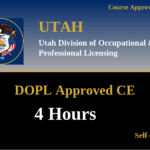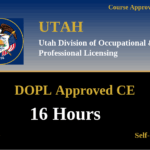
Utah Electrical License: A Guide to DOPL Requirements
Utah Electrical License Guide
Utah’s economy is booming, and the construction industry is at its heart. With construction employment seeing significant year-over-year growth and projections showing tens of thousands of new jobs on the horizon, the demand for skilled tradespeople has never been higher. For licensed electricians, this translates into a landscape ripe with opportunity.
However, construction firms report significant difficulty filling hourly craft positions, highlighting a critical shortage of qualified professionals. This high-demand environment makes holding a Utah electrical license more valuable than ever, opening doors to a stable, lucrative career. Whether you’re considering an electrician school, starting a Utah electrical apprenticeship, or you’re an established professional, understanding the state’s licensing landscape is the first step toward capitalizing on this growth.
From Salt Lake City’s urban expansion to new developments in renewable energy, the opportunities extend far beyond traditional wiring. The rise of smart home automation, energy-efficient retrofits, and the installation of electric vehicle (EV) charging stations are creating new specializations for electricians who stay ahead of the curve. This guide will walk you through the requirements set by the Utah Division of Occupational and Professional Licensing (DOPL).
Understanding Utah’s Electrical License Tiers
In Utah, the DOPL is the governing body responsible for issuing and renewing electrical licenses. The state has a clear, tiered structure that defines the scope of work an electrician can perform.
License Types and Career Progression
- Apprentice Electrician: The entry point. Must be registered with DOPL and work under the immediate supervision of a Journeyman or Master to log hours.
- Residential Journeyman Electrician: Permits work on residential properties. Faster track for those specializing in home systems.
- Journeyman Electrician: Qualified for residential, commercial, and industrial settings under the general supervision of a Master.
- Residential Master Electrician: Authorized to plan, lay out, and supervise other electricians on residential projects.
- Master Electrician: The highest level of certification. Master Electricians can supervise all project types, pull permits, and operate a contracting business.
How to Get Your Utah Electrical License: Pathways and Requirements
The path to licensure is a combination of classroom education, on-the-job training (OJT), and successful examination. Specific requirements vary significantly between license types.
| License Type | Experience and Education | Examination |
|---|---|---|
| Journeyman | Path A: 8,000 hrs OJT in apprenticeship + 4 year (576 hrs) classroom.
Path B: 16,000 hrs full-time work as an Apprentice. |
Single, combined examination that includes both Theory and Code. |
| Residential Journeyman | Path A: 4,000 hrs OJT + 2 year (288 classroom hours) electrical apprenticeship education.
Path B: 8,000 hrs full-time work as an Apprentice. |
Single, combined examination covering both Theory and Code. |
| Master Electrician | Path A: 8,000 hrs as a licensed Journeyman.
Path B: Bachelors or Masters degree in an electrical engineering program accredited by EAC/ABET+ 2,000 hours of work experience as a licensed Apprentice Electrician. Path C: Associate degree + 4,000 hrs as a Journeyman. |
Master Law and Rule Exam. |
For exam details, please refer to the Candidate Information Bulletin for the State of Utah.
How to Apply for a License
- Apprentice Electrician
- Journeyman Electrician
- Master Electrician
- Residential Journeyman Electrician
- Residential Master Electrician
Maintaining Your License: Utah Electrical Continuing Education
The electrical license renewal Utah process occurs every two years. All licensed electricians must complete 16 hours of continuing education (CE) per cycle. Licenses expire on November 30th of even-numbered years.
CE Hour Breakdown:
- 12 “Core” Hours: Mandatory technical subjects. (Min. 8 hours on the National Electrical Code Utah adopts; 4 hours on NFPA 70E Safety).
- 4 “Professional” Hours: Industry-related topics like OSHA, motor controls, or supervision skills.
ExpertCE offers DOPL-approved online electrical courses to fulfill these requirements. Browse our courses to find the right package for your renewal.
Navigating Code and License Verification
Staying current with the Utah electrical code is fundamental. Understanding definition changes in NEC 2023 and service equipment labeling requirements is essential for passing inspections and protecting your team.
DOPL Electrician Lookup
Verify an electrician’s status using the official Utah electrical license verification portal. This DOPL electrician lookup confirms whether a license is active and its expiration date.
Utah Continuing Education Courses
Explore our board-approved continuing education courses for Utah professionals:
View CE RequirementsUtah 2024 NFPA 70E Electrical Safety
Utah 2023 NEC Code Changes 16 Hours with 4 Hours NFPA 70E
Frequently Asked Questions (FAQ)
Every two years. The deadline is November 30th of each even-numbered year. You must complete 16 hours of CE and pay the renewal fee online.
Utah adopted the 2023 NEC, which became effective on July 1, 2023. Always check for specific state-wide amendments.
Verification is available on the official Utah Division of Occupational and Professional Licensing website via their free online search portal.
Disclaimer: The information provided in this educational content has been prepared with care to reflect current regulatory requirements for continuing education. However, licensing rules and regulations can vary by state and are subject to change. While we strive for accuracy, ExpertCE cannot guarantee that all details are complete or up to date at the time of reading. For the most current and authoritative information, always refer directly to your state’s official licensing board or regulatory agency.
NEC®, NFPA 70E®, NFPA 70®, and National Electrical Code® are registered trademarks of the National Fire Protection Association® (NFPA®)






